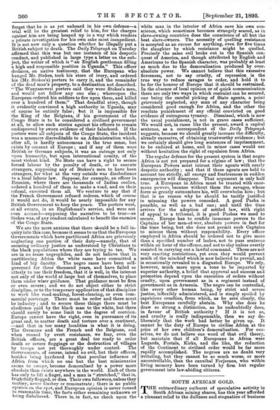SOUTH AFRICAN GOLD. T HE extraordinary outburst of speculative activity in
South African mining shares, has this year afforded a pleasant relief to the dullness and stagnation of business which generally prevails in the City throughout the autumn months. Both in the mass of securities affected and the multitude of operators, large and small, who are interested, this "boom" is said to outstrip easily all its predecessors,—even the great railway mania of the forties. A remarkable feature of the case has been the international character of the movement. The results of telegraphic communication have never been more strikingly ex- emplified than in this wonderful mining market, which was first stimulated into activity by the small purchases of French investors, who had been incited by the conver- sion of their national Routes to look further afield for profitable investments, and has since been constantly fed and kept in a state of feverish activity for nearly a year by an unceasing stream of buying orders from the provincial towns of Great Britain, from all the great Con- tinental centres, from Johannesburg and Cape Colony, from the United States of America, from Constantinople and Cairo, and even, it is said, from the prosperous farmers of the Argentine Republic. A certain amount of " arbi- trage " dealing with other leading centres, especially with Paris and New York, has long been a regular part of Stock Exchange business, but there never has been such a remarkable development of international unanimity as in the scramble for the shares dealt in in this particular market. This is an interesting point, as it illustrates the extraordinary susceptibility, both to favour- able and unfavourable influences, which the financial community has acquired from having stretched out its electric nerves all over the world. Just as the failure of an American industry, or the embarrassment of an Australian bank, is felt acutely within twenty-four hours all over the trading countries of the two hemispheres, so the discovery that interests in a great gold-field, the richness and possibilities of which had not hitherto been appraised at their true value, were to be picked up at low prices in London, set speculators and investors, almost from China to Peru, all agog to buy the shares. On the other hand, this development of a world-wide desire for certain securities, is likely enough to lead to the prices being carried up to a height that is unwarranted by their in- trinsic value. The supply of shares is, after all, limited, though company promoters are ready enough to add to their number by the resurrection of derelict properties, and the creation of new ventures more or less remotely con- nected with the original field of enterprise ; and when the appetite of all the world is whetted, the rush to buy becomes so headlong that investors have no time to reflect on counsels of prudence. And. for the same reason, when the boom is followed by the crash which experience shows us to be inevitable sooner or later, the collapse of the market is likely to be no less phenomenal than its rise, as all the causes which accentuated this extraordinary buoyancy will be present again to precipitate the downfall.
With this unpleasant side of the question, however, we are happily not concerned at the present moment. So far, in spite of occasional reactions, the boom — we must be excused for the use of this word, to express a phenomenon that did not exist when Dr. Johnson compiled his dictionary—has proceeded merrily, and has every appearance of continuing on its way. The question as to whether the prices of the South African mining shares are already ridiculously inflated, we gladly leave to our economic contemporaries. We prefer to dwell on the more favourable aspects of the matter,— namely, the fact that there is a solid basis of industry and prosperity behind this speculative upheaval, and that the development of the Rand Goldfield into the leading gold- producing centre of the world came at a very opportune moment to restore the spirits of financiers who were, com- paratively speaking, starving amid the general stagnation, and to assist, directly and indirectly, in that revival of trade which had so long been kept hack by the general want of confidence. English investors have had some heavy losses to write off since 1890, and were fully en- titled, according to the theory of averages, to a slice of compensating good fortune. Now they have got it at last, and wealth has been showered upon them freely if only they have had the wit to seize their opportunity, and if they are careful to gather their harvest before it is too late. Indirectly, the effects of such a turn of Fortune's wheel are almost incalculable. To mention only one obvious example of their working, it is not too much to say that the South African boom has saved a large proportion of the members of the Stock Exchange from ruin. A year ago, it was said that one-half of the members were living on the charity of the other half. Now this large com- munity of more than two thousand members, with an army of about three times as many clerks, have more work to do than they can cope with, and are making money as fast as they can book their bargains. And this fact has a far-reaching effect on the prices in other departments than the South African ; for the Stock Exchange, though nominally only a clearing-house that exists to expedite the purchase and sale of securities by the outside public, is, as a matter of fact, deeply interested in the com- modities in which it deals, and when the " House " is prosperous, the tone of markets is appreciably influenced all round. But apart from this minor, but perhaps not uninteresting, effect of this development, it is diffi- cult to overestimate the benefits that it has wrought by reviving confidence and breaking down the dams whisk were confining credit in narrow and unproductive channels. Speculation may be demoralising; no thoughtful man can live long in its atmosphere without being forced to the conclusion that it is. But the speculator is a very useful factor in the financial world ; he leads the way, and the investor and trader follow him. Very often he pays for his audacity, and nobody pities him, while the investor and trader, coming behind on a safer path and at a respectful distance, receive timely warning of his fate.
A good instance of the manner in which trade follows speculation is afforded by the fact that one of the first results of the present boom was a strong demand for mining machinery in South Africa. Turning to last month's Board of Trade Returns, we find that in August, 1894, mining machinery valued at £20,159, was shipped to South Africa from England, and in August, 1895, the shipments were valued at £41,631; during the first eight months of the current year the total shipped came to £285,540, against £154,015 last year. The figures for Australasia, where mining activity has been largely stimulated by the success of the South African field, are still more remarkable, though of course much smaller. Last month we sent .27,400 worth of machinery thither, against £80 worth in the corresponding period. These are solid figures, showing that however much the value of the Rand industry may be over-capitalised according to current market quotations, its development has had a stimulating effect on a very important branch of the home trade, at a time when the commercial outlook was other- wise dull and overcast ; for the demand for mining machinery made itself felt before the citizens of the United States had become free buyers of our produce. A parallel development is foreshadowed by the rumour which credits a leading South African magnate with the inten- tion of equipping and starting a new line of steamers to the Cape. The question of the Rand output of gold and its probable effect on the prices of commodities and the monetary history of the future, is a very interesting problem, but it is rather beyond the scope of this article. We may mention, however, that the gold turned out from the field is already worth about nine millions sterling per annum, and that many enthusiasts assert confidently that by the end of the present century, the annual output will be worth twenty millions. Such results cannot be ex- pected to last long, of course, and the feverish haste with which most of the mining companies are adding to their stamping-power will only suck the field dry all the sooner, but by the time that the Rand has passed its zenith, it is possible that the unproved regions of Rhodesia may be able to take its place. Finally, the thanks of all economic quietists will be given to the Rand Goldfield because its extraordinary fertility has blunted the keenest weapon in the Bimetallist armoury. No one now can seriously contend that gold is scarce, or likely to be scarce for years.



































 Previous page
Previous page